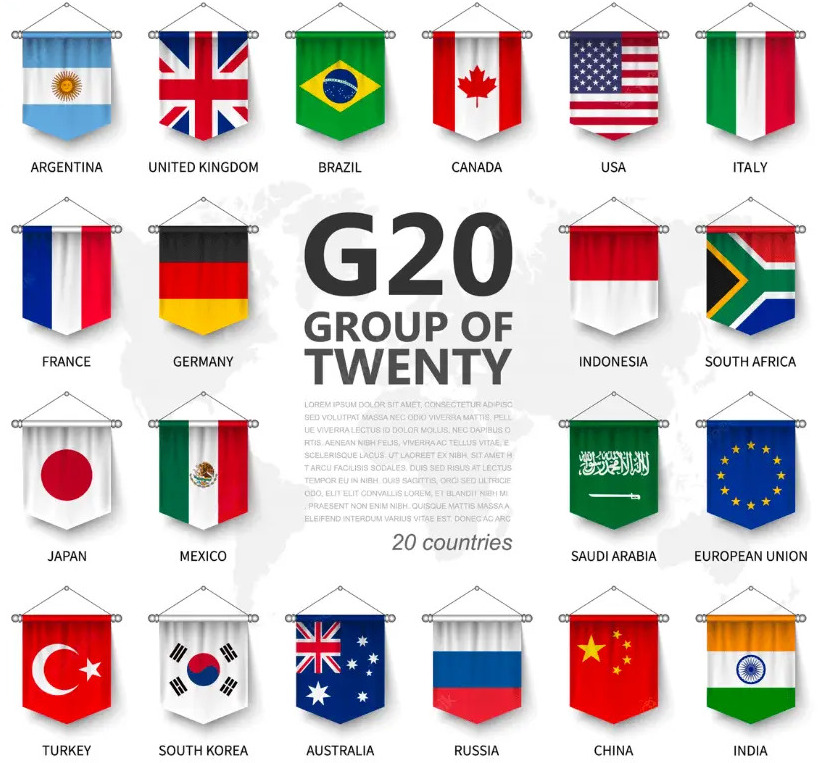
The Group of 20 addresses the most pressing global monetary and financial issues. It was founded in the 1990s in response to financial crises in several emerging economies and a growing recognition that some countries needed to be represented in global economic debate and governance. Argentina, Australia, Brazil, Canada, China, the European Union, France, Germany, India, Indonesia, Italy, Japan, Mexico, Russia, Saudi Arabia, South Africa, South Korea, Turkey, the United Kingdom, and the United States comprises the Group of 20. These countries account for roughly 90% of global GDP, 80% of international trade, and two-thirds of the worldwide population.
The G20 can be traced back to December 1999, following the 1997-98 Asian Financial Crisis, which was exacerbated in large part by the so-called Washington Consensus of the IMF and the World Bank and mishandled by the former; the G-7 Finance Ministers established the Financial Stability Forum (FSF) in 1999 for better coordination. In 1998, developing-country Finance Ministers and Central Bank Governors were invited to form the “G-20” forum of these functionaries. The G20 Presidency is rotated among the members annually and is chosen from a different regional grouping of countries. As a result, the 19 member countries are divided into five groups of up to four nations each. Most groups are formed on a regional basis; countries from the same region are typically grouped. Group 1 (Australia, Canada, Saudi Arabia, and the United States) and Group 2 (India, Russia, South Africa, and Turkey) follow a different pattern. Argentina, Brazil, and Mexico are in Group 3; France, Germany, Italy, and the United Kingdom are in Group 4; and China, Indonesia, Japan, and the Republic of Korea are in Group 5. As the twentieth member, the EU is not a member of these regional organisations. Every year, a different country from a diverse group takes over the G20 Presidency. When it is their Group’s turn, the countries in that Group are all equally entitled to assume the Presidency.
As mentioned, the G20 summit’s leadership constantly changes. Till date, seventeen G20 summits have been held. In November 2008, the US President hosted the First Summit in Washington to develop a coordinated response to the global financial crisis. The second summit was held in London in April 2009, followed by the third summit in Pittsburgh in September 2009. The recent summit, which was the 17th, was held in Bali in November, 2022. The leaders committed to working with developing countries, particularly low-income countries, and supporting them in implementing nationally driven policies and priorities necessary to achieve internationally agreed development goals, particularly the Millennium Development Goals (MDGs). They reaffirmed their commitment to holding trade and investment measures until the end of 2014.

India holds the G20 Presidency from 1 December 2022 to 30 November 2023. The participation of India in G20 becomes important as it is a major developing economy and has a vital stake in the stability of the international economic system. India has taken an active role in the G20 preparations, particularly on the Sherpa Track and the Finance Track. India’s agenda at the G20 Summit is driven by the need to increase financial system inclusivity to avoid protectionist tendencies and ensure that developing countries growth prospects do not suffer. India has worked hard to keep the global community focused on providing adequate financial flows to emerging economies to meet their developmental needs.
At the Seoul Summit, India welcomed the inclusion of development as a G20 process agenda item and endorsed the Seoul Development Consensus and associated Multi-Year Action Plans. India has kept the dynamism and credibility of G20 discussions alive by strengthening international financial regulatory systems, reforming Bretton Woods institutions, facilitating trade finance, and pushing forward the Doha agenda. As co-chair of the Framework Working Group on strong, sustainable, and balanced growth, India attempted to refocus the Group’s energies on growth, jobs, fiscal consolidation, rebalancing demand from the public to the private sector, and risks arising from internal imbalances within the Eurozone.
India remains committed to the G20 process of achieving a global economic and financial system that is stable, inclusive, and representative. The Maha Upanishad, an ancient Sanskrit text, inspired India’s G20 presidency theme, “Vasudhaiva Kutumbakam,” or “One Earth, One Family, One Future.”The theme emphasises the importance of all life – human, animal, plant, and microorganism – and their interconnectedness on Earth and in the larger universe.
The G20 is a global organisation focusing on international economic cooperation and decision-making. Hosting a G20 summit can be an excellent opportunity for a host country to highlight its economic and political priorities on a global scale.
Shruti Sharma
Shruti Sharma, a History graduate from Indraprastha College for Women. Her area of interest mainly lies with historical research, and inter-disciplinary research. Apart from this, she is really enthusiastic about visiting monuments and unexplored sites in Delhi.

